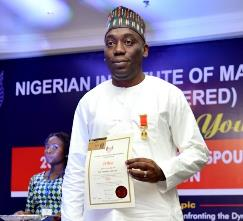Amidst the controversies that have dodged the construction of the multibillion naira Lagos to Calabar coastal road project, the former Executive Director, Marine and Operations, Nigerian Ports Authority (NPA), Engr. David Omonibeke has given reasons why he is in support of it.
In an exclusive interview with Maritime Bits, Omonibeke who is a Fellow of the Nigerian Society of Engineers (NSE), averred that the coastal road construction from Lagos to Calabar would bring several economic benefits to the nation and the towns along its route.
He added that it would also foster new businesses in the marine and blue economy sector recently established by the President Ahmed Bola Tinubu’s administration.
Describing the project as a “legacy project” of Tinubu’s government when fully completed, he enjoined Nigerians to support the project due to what he called its “potential benefits and opportunities”.
According to him, these potentials and opportunities include improved connectivity in the country, especially in the Southern part of the country. Better road infrastructure using concrete reinforcement has life span of 30-40 years with minimal maintenance and this road will enhance connectivity between coastal towns, facilitating the movement of goods, services and people. This can stimulate local economics by increasing trade and tourism.
He also explained that there would be tourism development as coastal towns could capitalize on their natural beauty and proximity to the ocean to attract more tourists.
“This could lead to the development of beach resorts, water sports facilities, and eco-tourism ventures, boosting local hospitality, entertainment, and service industries”, he added.
Continuing, Omonibeke said the successful construction of the coastal road project would enhance fisheries expansion in the country.
His words: “The construction of the coastal road may encourage investment in modern fishing infrastructure and aquaculture projects. This could lead to increased fish production, processing facilities, and seafood exports, thereby stimulating economic growth in coastal communities reliant on the fishing industry”.
According to Omonibeke who had had hitherto served in his home state, Bayelsa State prior to his appointment at the federal level, improved transportation links could attract investment in port infrastructure along the coast, facilitating import-export activities and fostering industrial growth. This could create job opportunities and attract businesses involved in shipping, logistics, and maritime services.
He stated that the blue economy ventures would receive a boost as the coastal road project could catalyze the development of new businesses in the blue economy sector such as marine renewable energy projects, offshore wind farms, wave energy, desalination plants, marine biotechnology research centers, and ocean conservation initiatives.
“These ventures could contribute to sustainable economic development while leveraging the rich marine resources of the coastal region”, he added.
Omonibeke also said that infrastructure investment was another reason why he was drumming support for the successful take off and completion of the coastal road project.
His words: “The construction phase of the coastal road project itself would generate employment opportunities and stimulate economic activity in the region. Local businesses such as construction firms, suppliers of construction materials, and service providers, would benefit from increased demand for their products and services. Overall, the coastal road construction from Lagos to Calabar has the potential to unlock economic opportunities, promote sustainable development, and improve livelihoods in the coastal towns along the route, while also fostering innovation and investment in the blue economy sector”.











